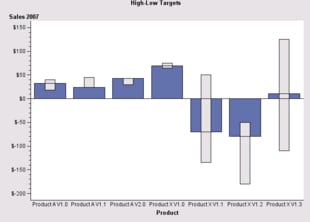
// SetHighLowTargets:

// To set target values on a BarChart, use the AnalysisVariable
// constructor to specify the variable(s) that store the
// target values and then assigning that Analysis variable
// to the chart's Response role. This example sets High
// and Low target values.
import com.sas.graphics.components.barchart.BarChart;
import com.sas.graphics.components.barchart.BarChartTableDataModel;
import com.sas.graphics.components.AnalysisVariable;
import com.sas.graphics.components.ClassificationVariable;
import com.sas.graphics.components.GraphConstants;
import javax.swing.table.DefaultTableModel;
import java.awt.BorderLayout;
import java.awt.Color;
import java.awt.Container;
import java.awt.event.WindowAdapter;
import java.awt.event.WindowEvent;
import javax.swing.JFrame;
import javax.swing.JPanel;
public class SetHighLowTargets extends JPanel {
private SetHighLowTargets theApp;
public SetHighLowTargets() {
setLayout(new BorderLayout());
// Create a BarChart and a data source
BarChart barChart=new BarChart();
SampleData dataTable=new SampleData();
// Create a data model and attach the data source
BarChartTableDataModel dataModel=
new BarChartTableDataModel();
dataModel.setModel(dataTable);
// Assign the Category variable role and Response
// variable role to appropriate variable
dataModel.setCategoryVariable(new ClassificationVariable(
"Product" // Data Column name
, null // format
, null // informat
, null // label
, GraphConstants.SORT_ASCENDING // sort
));
dataModel.setResponseVariable(new AnalysisVariable(
"Sales" // data column name
, "dollar" // format
, null // informat
, "Sales 2007" // label
, GraphConstants.STATISTIC_SUM // statistic
, "High" // data column with high values
, "High Target" // label
, "Low" // data column with low values
, "Low Target" // label
));
// Assign the data model to the BarChart
barChart.setDataModel(dataModel);
// Set a graph title
barChart.getTitle1().setText("High-Low Targets");
add(barChart, BorderLayout.CENTER);
}
// Create the data source
static private class SampleData extends DefaultTableModel {
private static Class columnClass[] = {String.class, Double.class, Double.class,
Double.class, Double.class, Double.class, Double.class };
private static String columnNames[] = {"Product", "ProductN", "Sales", "SalesTarget", "TargetDelta", "Low", "High" };
public SampleData() {
super();
Object data[][] = {
{"Product A V1.0", new Double(4), new Double(32), new Double(21), new Double(32-21), new Double(18), new Double(40) },
{"Product A V1.1", new Double(3), new Double(24), new Double(31), new Double(24-31), new Double(28), new Double(45) },
{"Product A V2.0", new Double(8), new Double(43), new Double(38), new Double(43-38), new Double(30), new Double(40) },
{"Product X V1.0", new Double(2), new Double(69), new Double(76), new Double(69-76), new Double(65), new Double(75) },
{"Product X V1.1", new Double(2), new Double(-70), new Double(-50), new Double(-70-50), new Double(-135), new Double(50) },
{"Product X V1.2", new Double(2), new Double(-80), new Double(-150), new Double(-70-150), new Double(-180), new Double(-50)},
{"Product X V1.3", new Double(6), new Double(11), new Double(100), new Double(11-100), new Double(-110), new Double(125)}
};
setDataVector(data, columnNames);
}
public Class getColumnClass(int column) {
return columnClass[column];
}
}
public static void main(String[] args) {
JFrame frame = new JFrame("BIP Graph Sample");
Container container = frame.getContentPane();
container.setLayout(new BorderLayout());
container.setBackground(Color.white);
JPanel bipPanel = new JPanel();
bipPanel.setLayout(new BorderLayout());
SetHighLowTargets bipGraphSample = new SetHighLowTargets();
bipPanel.add(bipGraphSample, BorderLayout.CENTER);
container.add(bipPanel, BorderLayout.CENTER);
frame.setSize(700,525);
frame.addWindowListener(new WindowAdapter() {
public void windowClosing(WindowEvent e) {
System.exit(0);
}
} );
frame.setVisible(true);
}
}